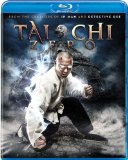| Reviews & Columns |
|
Reviews DVD TV on DVD Blu-ray 4K UHD International DVDs In Theaters Reviews by Studio Video Games Features Collector Series DVDs Easter Egg Database Interviews DVD Talk Radio Feature Articles Columns Anime Talk DVD Savant Horror DVDs The M.O.D. Squad Art House HD Talk Silent DVD
|
DVD Talk Forum |
|
|
| Resources |
|
DVD Price Search Customer Service #'s RCE Info Links |
|
Columns
|
|
|
Tai Chi Zero
Well Go USA // PG-13 // January 22, 2013
List Price: $29.98 [Buy now and save at Amazon]
The Film:
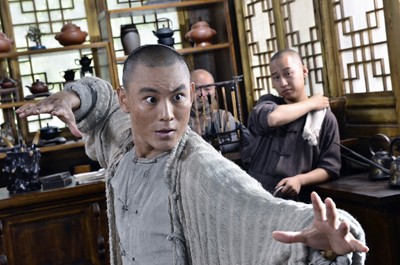 Overclocked and underperforming -- really, that's the best description I can think of for Tai Chi Zero, the recent martial-arts adventure from House of Fury director Stephen Fung. Branded as a "steampunk king-fu throwdown" in its most prominent trailer with twirling gears, violent mechs, and extensive brawls boasting a vigorous fantastical journey into a cross-bred environment, the film presented here instead hybridizes and juxtaposes with other, lesser ideas in mind, trying much too hard for its own good. Essentially, it's a representation of a creative brain infused with too much caffeine, where a clutter of outside-the-box ideas inspired to combine video games, anime, and cinema surrender to a dearth of substance powering them. Rendering a film hesitant to decide on the tone it wants to achieve and void of the base diversions-value needed to hold one's attention while observing the chaos, this unfortunately isn't the bracing, inventive rush of Asian filmmaking one might expect.
Overclocked and underperforming -- really, that's the best description I can think of for Tai Chi Zero, the recent martial-arts adventure from House of Fury director Stephen Fung. Branded as a "steampunk king-fu throwdown" in its most prominent trailer with twirling gears, violent mechs, and extensive brawls boasting a vigorous fantastical journey into a cross-bred environment, the film presented here instead hybridizes and juxtaposes with other, lesser ideas in mind, trying much too hard for its own good. Essentially, it's a representation of a creative brain infused with too much caffeine, where a clutter of outside-the-box ideas inspired to combine video games, anime, and cinema surrender to a dearth of substance powering them. Rendering a film hesitant to decide on the tone it wants to achieve and void of the base diversions-value needed to hold one's attention while observing the chaos, this unfortunately isn't the bracing, inventive rush of Asian filmmaking one might expect.
Tai Chi Zero doesn't waste any time losing itself in the excess, either. After an unfocused beginning where slow-motion brawls set to heavy-metal music coexist with an overlong silent-movie-inspired backstory, the story eventually restrains itself a bit once we've learned about Lu Chan (Yuan Xiaochao), an orphan with a pressure-point on his head that transforms him into a furious warrior who mimics the kung-fu tactics he observes. There's a drawback: every time he's had this point "activated", and it's been frequent given his place among a military faction, his life's essence has been lowered. To counterbalance this, Lu Chan must travel to a village nestled in the heart of a mountain range, the Chen Village, to learn a specific kind of kung-fu that soothes his internal energy and might keep him alive through practice. The village, however, doesn't allow outsiders to learn their craft, forcing Lu Chan to get creative with his pursuit to learn. But once the village comes under attack by a steam-powered machine, he might prove more useful than they're willing to admit.
Tai Chi Zero becomes all about how its visual method shapes the film's tone, and it's quite unruly. Big, bold descriptions of the characters (and actors!) and their fighting styles, blipping health bars, and vibrant fighting-game graphics are easy reminders of the pop-culture dressings that were impressively realized in Scott Pilgrim vs. The World, which were pertinent to that specific story. Here, those visual elements -- futuristic circles and curved lines underneath feet mid-battle, graphical animations overly inspired by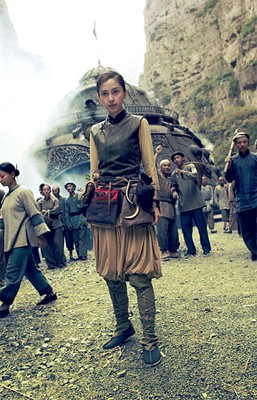 Adobe Illustrator techniques, and a literal "Bam!" here and there -- feel out-of-place and superfluous against a transitory Chinese countryside on the cusp of industrialization; in fact, as we eventually learn, they're fighting against industrialization. Stephen Fung clearly wants to achieve vibrant and cheeky tones that butt heads with the setting, akin to something between Detective Dee and Kung-Fu Hustle with an underdog-turned-champion, but these tactics distract far more than they intrigue (and that's coming from someone who really digs Hausu).
Adobe Illustrator techniques, and a literal "Bam!" here and there -- feel out-of-place and superfluous against a transitory Chinese countryside on the cusp of industrialization; in fact, as we eventually learn, they're fighting against industrialization. Stephen Fung clearly wants to achieve vibrant and cheeky tones that butt heads with the setting, akin to something between Detective Dee and Kung-Fu Hustle with an underdog-turned-champion, but these tactics distract far more than they intrigue (and that's coming from someone who really digs Hausu).
Perhaps it's because these overt tricks add flash where more appealing, tangible elements -- namely the steampunk-infused aesthetic and brisk martial-arts brawls -- would've felt more suited for Tai Chi Zero's purposes. Aside from the opening scene, which does feature some fairly hard-hitting fight sequences (accompanied by jarring heavy metal music), the fisticuffs Stephen Fung drops into the film center on Lu Chan's semi-pacifistic battle through the townspeople, including tofu choppers and young girls, so he might earn their respect and allow him to learn their fighting style. While this rhythm could evoke hard-hitting martial arts, that's not the case here; they're semi-graceful, mostly void of firm aggression, and altogether not very entertaining when they're broken up by limp, buzzed humor. Instead of persistent battles in an environment of spinning mechanics and billowing steam, it's a fanciful underdog story focused on preserving the seclusion of a self-sufficient, non-mechanized town and its martial-arts secrets -- which would've been great, if handled differently.
Of course, one might need to understand that Tai Chi Zero intends on being the starting point for a trilogy, which very well could delve deeper into those things lacking from this installment. However, this story of isolation and industrialization, and an outcast from the town who evolves into a villain concerned with those matters, doesn't work as a standalone piece of work due to its scattered focus and waning narrative. Stephen Fung's willingness to apply off-the-wall components to his film deserves some endorsement, along with keeping his ducks in a row while doing so; however, the rush of visual invention wears off, quickly, the rich photography and intricate production losing their ability to mask the capricious storytelling underneath. And when a preposterous conclusion attempts to replace common sense and momentum with flying vegetables and fickle melodrama, all the health bars, beautiful women, and explosions in the world won't prevent some from wishing it were more of a rough-and-tumble, steampunk throwdown than it ends up being.
The Blu-ray:
Video and Audio:
Make no mistake: Tai Chi Zero is, all point considered, a eye-catching visual experience replete with shrewd production design, off-the-wall techniques, and robust textual and animation-style graphics. Well Go USA maintains their current reputation of high-quality Blu-ray releases here with a vivid presentation of the constantly-moving, colorful photography and outlandish flourishes scattered throughout, preserving the fluidity of combat, the sheen of metal, and the depth of dark wood shades to highly-impressive extents. Close-ups are everywhere in this film, so it's a good thing that the disc's focus on fine detail and skin-tone gradation are, by and large, quite exquisite; dirt, tears, and the crinkles of Lu Chan's "Three Blossom" pressure point appear fantastic during the close-ups. The earthen environment of the Chen Village, from loose-pebble walkways to compelling wood structures, further that perception of detail and color solidity. A few scenes exhibit reddish-black contrast and there's a slightly-smooth appearance to some shots that might derive from the source, but overall it's a gripping visual rendering.
The audio is largely pretty spectacular too, but in arenas you might not expect. Sure, there's a bit of vigorous clanking of metal, a few thumps and kicks, and a handful of explosions which test the sprawling sound design and lower-frequency elements of this 5.1 Chinese Master Audio track in conventional ways, and it does so incredibly well, but it's the smaller, ambient elements which really accentuate the clarity of this track. Alongside the video-game graphics come the quirky sound effects, which blip and jingle exquisitely, it's the sounds of feet scraping through pebbled streets, the jiggle of fresh tofu, the caress of a clay bowl and the slip-'n-shimmy of fabric that express extremely well-done detail preservation in the smaller areas. Dialogue remains impeccably presented, the heavy-metal music intrudes on the design without being "intrusive", and the bustle of battle which crops up in Tai Chi Zero is capable and aware of where it needs to hit hard and where it needs to restrain itself. An English dub is also available, along with rather good English (and Chinese) subtitles.
Special Features:
Not a lot of substance has been made available in the features department: aside from Muzic Videoz and three Trailerz (HD) -- the more accurate Ultimate US Trailer, the Online Trailer, and a Teaser -- Well Go USA have also presented a series of press-kit caliber Behind the Zenes (5:43, SD) pieces that feature brief interviews and assembly clips alongside discussion about the project's ambitions. And yes, folks, those "Zs" are intentional; that's how they appear in the menus.
Final Thoughts:
I wanted to feel more included in the fun that Tai Chi Zero clearly appears to be having. Heavy metal music, video-game accouterments, and inane humor against the backdrop of a rustic village surrounded by steampunk influences in the distance make Stephen Fung's martial-arts adventure out to be an exhilarating romp. However, as it's presented here, the film's aspirations for what it wants to be -- somewhere between Kung-Fu Hustle and Scott Pilgrim -- aren't exactly what materialize on-screen, where the goofy tactics and measured martial-arts work only gel together into a marginally interesting confection of scattered and chaotic visual interests. What's more, when the action only meagerly delivers and the steampunk influence remains at arm's length, this film prevents itself from being the robust "throwdown" that it possible could've been. Too much of some, not enough of the other. Well Go USA's visual and aural treatment are, of course, extremely satisfying, which will make giving this one a Rental a satisfying one-off experience.
Thomas Spurlin, Staff Reviewer -- DVDTalk Reviews | Personal Blog/Site
 Overclocked and underperforming -- really, that's the best description I can think of for Tai Chi Zero, the recent martial-arts adventure from House of Fury director Stephen Fung. Branded as a "steampunk king-fu throwdown" in its most prominent trailer with twirling gears, violent mechs, and extensive brawls boasting a vigorous fantastical journey into a cross-bred environment, the film presented here instead hybridizes and juxtaposes with other, lesser ideas in mind, trying much too hard for its own good. Essentially, it's a representation of a creative brain infused with too much caffeine, where a clutter of outside-the-box ideas inspired to combine video games, anime, and cinema surrender to a dearth of substance powering them. Rendering a film hesitant to decide on the tone it wants to achieve and void of the base diversions-value needed to hold one's attention while observing the chaos, this unfortunately isn't the bracing, inventive rush of Asian filmmaking one might expect.
Overclocked and underperforming -- really, that's the best description I can think of for Tai Chi Zero, the recent martial-arts adventure from House of Fury director Stephen Fung. Branded as a "steampunk king-fu throwdown" in its most prominent trailer with twirling gears, violent mechs, and extensive brawls boasting a vigorous fantastical journey into a cross-bred environment, the film presented here instead hybridizes and juxtaposes with other, lesser ideas in mind, trying much too hard for its own good. Essentially, it's a representation of a creative brain infused with too much caffeine, where a clutter of outside-the-box ideas inspired to combine video games, anime, and cinema surrender to a dearth of substance powering them. Rendering a film hesitant to decide on the tone it wants to achieve and void of the base diversions-value needed to hold one's attention while observing the chaos, this unfortunately isn't the bracing, inventive rush of Asian filmmaking one might expect. Tai Chi Zero doesn't waste any time losing itself in the excess, either. After an unfocused beginning where slow-motion brawls set to heavy-metal music coexist with an overlong silent-movie-inspired backstory, the story eventually restrains itself a bit once we've learned about Lu Chan (Yuan Xiaochao), an orphan with a pressure-point on his head that transforms him into a furious warrior who mimics the kung-fu tactics he observes. There's a drawback: every time he's had this point "activated", and it's been frequent given his place among a military faction, his life's essence has been lowered. To counterbalance this, Lu Chan must travel to a village nestled in the heart of a mountain range, the Chen Village, to learn a specific kind of kung-fu that soothes his internal energy and might keep him alive through practice. The village, however, doesn't allow outsiders to learn their craft, forcing Lu Chan to get creative with his pursuit to learn. But once the village comes under attack by a steam-powered machine, he might prove more useful than they're willing to admit.
Tai Chi Zero becomes all about how its visual method shapes the film's tone, and it's quite unruly. Big, bold descriptions of the characters (and actors!) and their fighting styles, blipping health bars, and vibrant fighting-game graphics are easy reminders of the pop-culture dressings that were impressively realized in Scott Pilgrim vs. The World, which were pertinent to that specific story. Here, those visual elements -- futuristic circles and curved lines underneath feet mid-battle, graphical animations overly inspired by
 Adobe Illustrator techniques, and a literal "Bam!" here and there -- feel out-of-place and superfluous against a transitory Chinese countryside on the cusp of industrialization; in fact, as we eventually learn, they're fighting against industrialization. Stephen Fung clearly wants to achieve vibrant and cheeky tones that butt heads with the setting, akin to something between Detective Dee and Kung-Fu Hustle with an underdog-turned-champion, but these tactics distract far more than they intrigue (and that's coming from someone who really digs Hausu).
Adobe Illustrator techniques, and a literal "Bam!" here and there -- feel out-of-place and superfluous against a transitory Chinese countryside on the cusp of industrialization; in fact, as we eventually learn, they're fighting against industrialization. Stephen Fung clearly wants to achieve vibrant and cheeky tones that butt heads with the setting, akin to something between Detective Dee and Kung-Fu Hustle with an underdog-turned-champion, but these tactics distract far more than they intrigue (and that's coming from someone who really digs Hausu). Perhaps it's because these overt tricks add flash where more appealing, tangible elements -- namely the steampunk-infused aesthetic and brisk martial-arts brawls -- would've felt more suited for Tai Chi Zero's purposes. Aside from the opening scene, which does feature some fairly hard-hitting fight sequences (accompanied by jarring heavy metal music), the fisticuffs Stephen Fung drops into the film center on Lu Chan's semi-pacifistic battle through the townspeople, including tofu choppers and young girls, so he might earn their respect and allow him to learn their fighting style. While this rhythm could evoke hard-hitting martial arts, that's not the case here; they're semi-graceful, mostly void of firm aggression, and altogether not very entertaining when they're broken up by limp, buzzed humor. Instead of persistent battles in an environment of spinning mechanics and billowing steam, it's a fanciful underdog story focused on preserving the seclusion of a self-sufficient, non-mechanized town and its martial-arts secrets -- which would've been great, if handled differently.
Of course, one might need to understand that Tai Chi Zero intends on being the starting point for a trilogy, which very well could delve deeper into those things lacking from this installment. However, this story of isolation and industrialization, and an outcast from the town who evolves into a villain concerned with those matters, doesn't work as a standalone piece of work due to its scattered focus and waning narrative. Stephen Fung's willingness to apply off-the-wall components to his film deserves some endorsement, along with keeping his ducks in a row while doing so; however, the rush of visual invention wears off, quickly, the rich photography and intricate production losing their ability to mask the capricious storytelling underneath. And when a preposterous conclusion attempts to replace common sense and momentum with flying vegetables and fickle melodrama, all the health bars, beautiful women, and explosions in the world won't prevent some from wishing it were more of a rough-and-tumble, steampunk throwdown than it ends up being.
The Blu-ray:
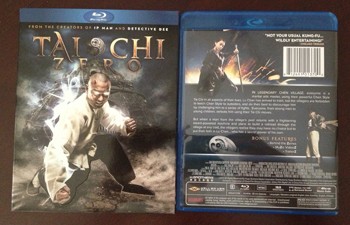 | 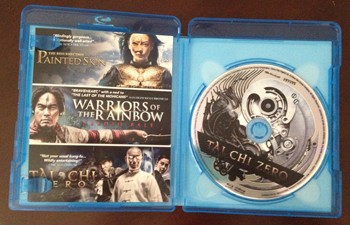 |
Video and Audio:
Make no mistake: Tai Chi Zero is, all point considered, a eye-catching visual experience replete with shrewd production design, off-the-wall techniques, and robust textual and animation-style graphics. Well Go USA maintains their current reputation of high-quality Blu-ray releases here with a vivid presentation of the constantly-moving, colorful photography and outlandish flourishes scattered throughout, preserving the fluidity of combat, the sheen of metal, and the depth of dark wood shades to highly-impressive extents. Close-ups are everywhere in this film, so it's a good thing that the disc's focus on fine detail and skin-tone gradation are, by and large, quite exquisite; dirt, tears, and the crinkles of Lu Chan's "Three Blossom" pressure point appear fantastic during the close-ups. The earthen environment of the Chen Village, from loose-pebble walkways to compelling wood structures, further that perception of detail and color solidity. A few scenes exhibit reddish-black contrast and there's a slightly-smooth appearance to some shots that might derive from the source, but overall it's a gripping visual rendering.
The audio is largely pretty spectacular too, but in arenas you might not expect. Sure, there's a bit of vigorous clanking of metal, a few thumps and kicks, and a handful of explosions which test the sprawling sound design and lower-frequency elements of this 5.1 Chinese Master Audio track in conventional ways, and it does so incredibly well, but it's the smaller, ambient elements which really accentuate the clarity of this track. Alongside the video-game graphics come the quirky sound effects, which blip and jingle exquisitely, it's the sounds of feet scraping through pebbled streets, the jiggle of fresh tofu, the caress of a clay bowl and the slip-'n-shimmy of fabric that express extremely well-done detail preservation in the smaller areas. Dialogue remains impeccably presented, the heavy-metal music intrudes on the design without being "intrusive", and the bustle of battle which crops up in Tai Chi Zero is capable and aware of where it needs to hit hard and where it needs to restrain itself. An English dub is also available, along with rather good English (and Chinese) subtitles.
Special Features:
Not a lot of substance has been made available in the features department: aside from Muzic Videoz and three Trailerz (HD) -- the more accurate Ultimate US Trailer, the Online Trailer, and a Teaser -- Well Go USA have also presented a series of press-kit caliber Behind the Zenes (5:43, SD) pieces that feature brief interviews and assembly clips alongside discussion about the project's ambitions. And yes, folks, those "Zs" are intentional; that's how they appear in the menus.
Final Thoughts:
I wanted to feel more included in the fun that Tai Chi Zero clearly appears to be having. Heavy metal music, video-game accouterments, and inane humor against the backdrop of a rustic village surrounded by steampunk influences in the distance make Stephen Fung's martial-arts adventure out to be an exhilarating romp. However, as it's presented here, the film's aspirations for what it wants to be -- somewhere between Kung-Fu Hustle and Scott Pilgrim -- aren't exactly what materialize on-screen, where the goofy tactics and measured martial-arts work only gel together into a marginally interesting confection of scattered and chaotic visual interests. What's more, when the action only meagerly delivers and the steampunk influence remains at arm's length, this film prevents itself from being the robust "throwdown" that it possible could've been. Too much of some, not enough of the other. Well Go USA's visual and aural treatment are, of course, extremely satisfying, which will make giving this one a Rental a satisfying one-off experience.
|
| Popular Reviews |
| Sponsored Links |
|
|
| Sponsored Links |
|
|
| Release List | Reviews | Shop | Newsletter | Forum | DVD Giveaways | Blu-Ray | Advertise |
|
Copyright 2024 DVDTalk.com All Rights Reserved. Legal Info, Privacy Policy, Terms of Use,
Manage Preferences,
Your Privacy Choices | |||||||









